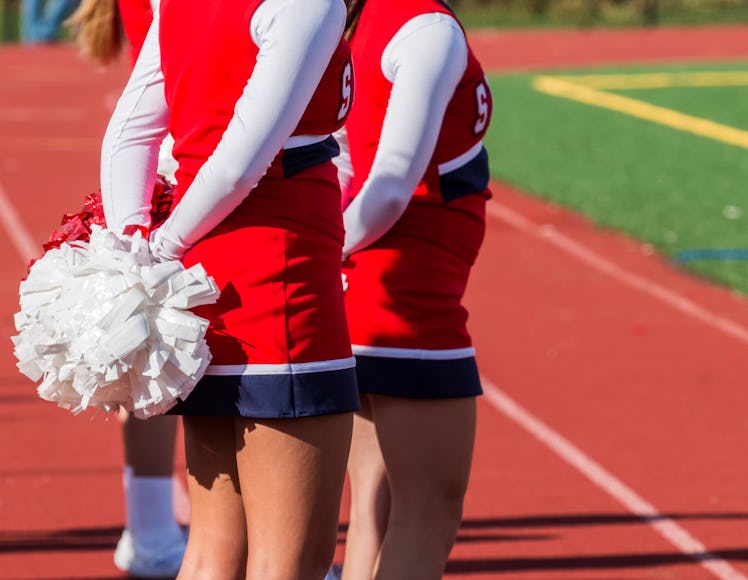
The Supreme Court Just Made A Huge Ruling For Student Free Speech
Send your Snaps with a clear conscience, everyone!
For many high schoolers, having your most extra years documented on the internet is just a fact of life. But for one Pennsylvania high school student, her teen angst won’t just fade into the endless flood of online content — it’ll go down in history books forever. The Mahanoy Area School District v. B.L. Supreme Court ruling is a huge step forward for the First Amendment rights of high school students everywhere, thanks to one outspoken cheerleader. Come for the free speech rights, stay to read an 82-year-old Supreme Court justice write with 100% sincerity about the legal value of a freshman’s “f*ck cheer” Snaps.
On June 23, the Supreme Court issued a nearly unanimous 8-1 decision that a Pennsylvania school district violated a student’s First Amendment rights by punishing her for a, well, profanely phrased social media post. Justice Clarence Thomas was the only dissenting court member. At the center of the case was the question of whether schools could punish students for speech that happened off-campus and outside of school hours — to which the court returned a resounding no.
“It might be tempting to dismiss [the student’s] words as unworthy of the robust First Amendment protections discussed herein. But sometimes it is necessary to protect the superfluous in order to preserve the necessary,” wrote Justice Stephen Breyer in the majority opinion. While the court observed that schools had the right to discipline students, and that the changing nature of digital learning and technology meant that the lines between on- and off-campus had gotten a little blurry, they ruled the school couldn’t just punish student speech (even if it was insulting or sweary) as long as it wasn’t otherwise disrupting the school environment.
The case centered around Brandi Levy, a cheerleader at the Mahanoy Area School District (MASD). In 2017, Levy, who is referred to in the lawsuit by her initials since she’s a minor, tried out for varsity cheerleading, but didn’t make the team. Disappointed, she made the profanity-laden — and deeply relatable — post via Snapchat, off school grounds and outside of school hours.
“F*ck school f*ck softball f*ck cheer f*ck everything,” Levy captioned over a photo of herself and a friend with their middle fingers raised, per The New York Times. She made the post on a Saturday from a popular convenience store off school grounds. Levy’s post was shared with about 250 people, “many of whom were [Mahanoy] students and some of whom were cheerleaders,” according to case facts. Per the Times, one student took a screenshot of Levy’s message and shared it with her mom, a school coach. As a result, Levy was punished by being suspended from cheerleading for a year to “avoid chaos” and keep a “teamlike environment.” In turn, Levy and her family pursued legal action against the school district under 42 U.S.C. § 1983, alleging that her suspension violated her First Amendment rights.
The Supreme Court’s ruling now largely follows precedent from the 1969 Supreme Court case Tinker v. Des Moines Independent Community School District, which established that yes, students still have free speech rights on campus. In that case, high school siblings John and Mary Beth Tinker sued their school over their right to wear an armband protesting the Vietnam War. The court sided with the Tinkers, writing, “It can hardly be argued that either students or teachers shed their constitutional rights to freedom of speech or expression at the schoolhouse gate.” The case set the standard that, in order for schools to limit student expression, that speech would have to cause a “substantial disruption” to the learning environment. In Levy’s case, the court used that standard to measure the effect of her out-of-school Snap on her school environment. Ultimately, they judged the potential for disruption wasn’t strong enough to justify punishing her — even if the school might have been able to justify punishment if she had said it on-campus.
However, the justices drew the line at setting down hard definitions of what actually counts as on- or off-campus speech. “Particularly given the advent of computer-based learning, we hesitate to determine precisely which of many school-related off-campus activities belong on such a list. Neither do we now know how such a list might vary, depending upon a student’s age, the nature of the school’s offcampus activity, or the impact upon the school itself,” Breyer wrote. The majority also noted that there were cases where schools could punish or restrict off-campus speech, including bullying, threats, or instances where a student misused school property (like a computer).
It’s pretty much a teenage requirement to rebel against the system — and with so many young people becoming leaders in heavyweight political movements, the First Amendment rights of high schoolers may be more important now than ever. So while Levy’s Supreme Court success may seem like one small step for a single cheerleader, it’s actually one giant leap for young activists in America. Can we get a rah-rah for that?